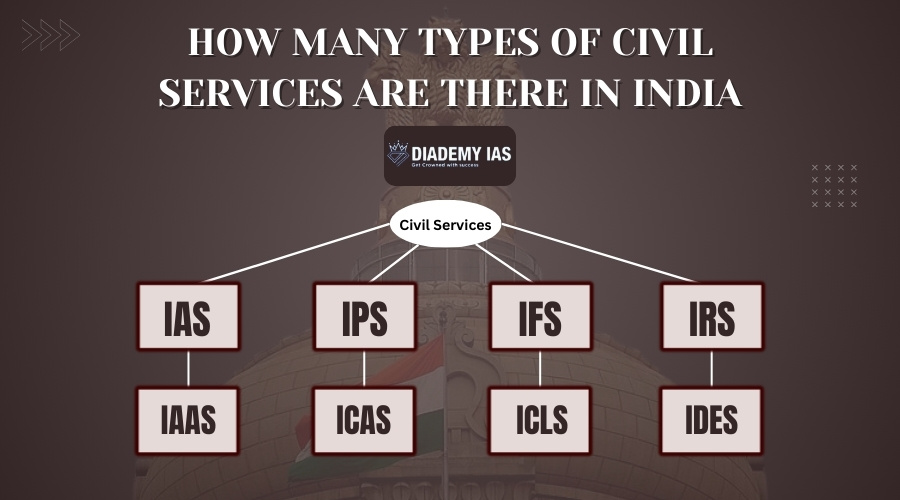UPSC Civil Services: Types of Jobs
Uncover the diverse range of career opportunities in the civil services with our comprehensive guide to the UPSC exams.

Table of Contents
The Union Public Service Commission conducts the Civil Service Examination (CSE) to fill positions for 24 different civil services. This exam is a well-respected path to many exciting career opportunities in India’s government. For countless aspiring candidates, it’s not just an exam; it’s a chance to make a real difference in society. The civil services include a variety of roles, such as IAS officers who help shape national policies and IPS officers who maintain law and order. Each job offers unique challenges and rewards, making them attractive to many people.
In this guide, we will explore the different types of civil services and what each role entails. Whether you are interested in the strategic work of the Indian Foreign Service (IFS), the community-focused efforts of the Indian Administrative Service (IAS), or the fast-paced life of the Indian Police Service (IPS), knowing about these paths is essential for your preparation. Join us as we break down the qualifications, responsibilities, and career paths for each role, helping you understand how to embark on a rewarding career in civil services. Your journey in public service starts here!
UPSC Posts – 3 Types of Civil Services
1. All India Civil Services
- Indian Administrative Service (IAS)
- Indian Police Service (IPS)
- Indian Forest Service (IFoS)
2. Group ‘A’ Civil Services
- Indian Foreign Service (IFS)
- Indian Audit and Accounts Service (IAAS)
- Indian Civil Accounts Service (ICAS)
- Indian Corporate Law Service (ICLS)
- Indian Defence Accounts Service (IDAS)
- Indian Defence Estates Service (IDES)
- Indian Information Service (IIS)
- Indian Ordnance Factories Service (IOFS)
- Indian Communication Finance Services (ICFS)
- Indian Postal Service (IPoS)
- Indian Railway Accounts Service (IRAS)
- Indian Railway Personnel Service (IRPS)
- Indian Railway Traffic Service (IRTS)
- Indian Revenue Service (IRS)
- Indian Trade Service (ITS)
- Railway Protection Force (RPF)
3. Group ‘B’ Civil Services
- Armed Forces Headquarters Civil Service
- DANICS
- DANIPS
- Pondicherry Civil Service
- Pondicherry Police Service
Indian Administrative Services (IAS)
The Indian Administrative Services (IAS) is one of the most sought-after civil services jobs in India. IAS officers hold key positions in the administration and play a crucial role in policy-making and implementation at both the state and central levels.
Start Your UPSC Prepartion
Contact Diademy Today for Best MentorShip Under CA Rahul Kumar
To become an IAS officer, candidates must meet certain eligibility criteria, including age and educational qualifications. The UPSC exam for IAS consists of three stages - Preliminary, Mains, and Interview. It covers a wide range of subjects, from history and geography to current affairs and general knowledge.
Preparation for the IAS exam requires dedication and strategic planning. Candidates are advised to start early, make use of study materials and resources, and practice writing answers to improve their writing skills.
IAS officers enjoy a high level of job security, attractive perks, and opportunities for career growth through promotions and transfers.
Indian Police Services (IPS)
The Indian Police Services (IPS) is another prestigious civil services job that offers a challenging and rewarding career in law enforcement. IPS officers are responsible for maintaining law and order, preventing crime, and ensuring the safety and security of citizens.
Aspiring IPS officers must fulfill specific eligibility criteria, including age, educational qualifications, and physical fitness standards. The UPSC exam for IPS consists of written tests, interviews, and physical fitness assessments.
Training for IPS officers includes a blend of classroom instruction, fieldwork, and practical exercises to develop their leadership and decision-making skills. Career progression for IPS officers is based on performance evaluations and seniority.
Indian Foreign Services (IFS)
The Indian Foreign Services (IFS) is a prestigious civil services job that offers diplomats the opportunity to represent India on the global stage. IFS officers play a crucial role in promoting bilateral relations, protecting Indian interests abroad, and negotiating international agreements.
Eligibility criteria for IFS officers include age, educational qualifications, and language proficiency in at least one foreign language. The UPSC exam for IFS evaluates candidates' knowledge of international relations, diplomacy, and global issues.
IFS officers are posted to Indian embassies and consulates around the world, where they work to strengthen diplomatic ties, facilitate trade and cultural exchanges, and address consular issues affecting Indian nationals.
Opportunities for career advancement in the IFS include promotions, transfers to key positions in the Ministry of External Affairs, and assignments to international organizations and missions.
Indian Revenue Services (IRS)
The Indian Revenue Services (IRS) is a challenging civil services job that involves tax administration and revenue collection for the government. IRS officers are responsible for ensuring compliance with tax laws, detecting tax evasion, and promoting voluntary tax compliance.
Eligibility criteria for IRS officers include age, educational qualifications, and a thorough understanding of financial principles and tax laws. The UPSC exam for IRS includes assessments of candidates' knowledge of accounting, finance, and economics.
IRS officers have opportunities for specialized training in areas such as tax auditing, investigation, and prosecution. Career growth in the IRS is based on performance evaluations, professional development, and specialized skills.
Indian Forest Services (IFS)
The Indian Forest Services (IFS) offers a unique civil services job for individuals passionate about conservation and environmental protection. IFS officers are responsible for managing and preserving India's diverse forest resources, wildlife habitats, and protected areas.
Eligibility criteria for IFS officers include age, educational qualifications, and a strong interest in environmental science and conservation. The UPSC exam for IFS covers topics such as forestry, wildlife conservation, and sustainable resource management.
IFS officers work closely with forest officials, environmental researchers, and local communities to develop and implement conservation strategies, wildlife protection measures, and sustainable forestry practices.
Career prospects in the IFS include opportunities for research, policy analysis, and advocacy on environmental issues at the national and international levels.
Indian Engineering Services (IES)
The Indian Engineering Services (IES) offers civil services jobs for engineers seeking to contribute their technical expertise to government projects and infrastructure development. IES officers are responsible for planning, designing, and supervising engineering projects in various sectors.
Eligibility criteria for IES officers include age, educational qualifications in engineering disciplines, and technical proficiency in their chosen field. The UPSC exam for IES assesses candidates' knowledge of engineering principles, project management, and technical specifications.
IES officers receive specialized training in areas such as project implementation, quality control, and safety regulations. Career advancement in the IES is based on performance evaluations, professional certifications, and project management experience.
Unlock Your Dream Career with UPSC Exams
Stay Informed. Get a Free Counselling Today!
Conclusion
In conclusion, the UPSC civil services exam opens the door to a wide range of prestigious government jobs that offer opportunities for public service, professional growth, and personal fulfillment. Whether you aspire to become an IAS officer, IPS officer, IFS diplomat, IRS tax administrator, IFS forest conservator, or IES engineer, the UPSC exam provides a pathway to a rewarding career in civil services.
By understanding the different types of civil services jobs, their eligibility criteria, exam patterns, and career prospects, you can make an informed decision about which service aligns with your interests, skills, and aspirations. Good luck on your journey to becoming a civil servant and serving the nation with dedication and integrity!
FAQs on Types of Civil Services
1. What are the main types of civil services in India?
The primary civil services in India are divided into three major categories:
- Indian Administrative Service (IAS): Responsible for policy formulation and implementation, as well as district administration.
- Indian Police Service (IPS): Focuses on maintaining law and order, crime prevention, and internal security.
- Indian Foreign Service (IFS): Manages India’s foreign relations and diplomacy.
2. How do the roles in civil services differ from one another?
Each civil service has unique functions:
- IAS officers primarily work on governance, administration, and development at various levels, including district and state.
- IPS officers handle law enforcement, ensuring public safety, investigating crimes, and managing police forces.
- IFS officers engage in diplomatic missions, representing India abroad and dealing with international relations. Each service requires different skill sets and approaches to public service.
3. What qualifications are needed to join these civil services?
Candidates must hold a bachelor’s degree from a recognized university to be eligible for the UPSC Civil Services Examination. The selection process includes a preliminary exam, a main exam, and a personal interview. Specific services may also value additional skills, such as language proficiency for the IFS or physical fitness for the IPS.
4. Are there any specialized branches within civil services?
Yes, there are several specialized branches within civil services that cater to specific functions. For example, the Indian Revenue Service (IRS) focuses on tax collection and financial management, while the Indian Forest Service (IFS) deals with forestry and wildlife conservation. Additionally, the Indian Information Service (IIS) handles government communication and media relations. Each specialized branch has its own set of responsibilities, training, and career opportunities, allowing candidates to choose paths that align with their interests and skills.



